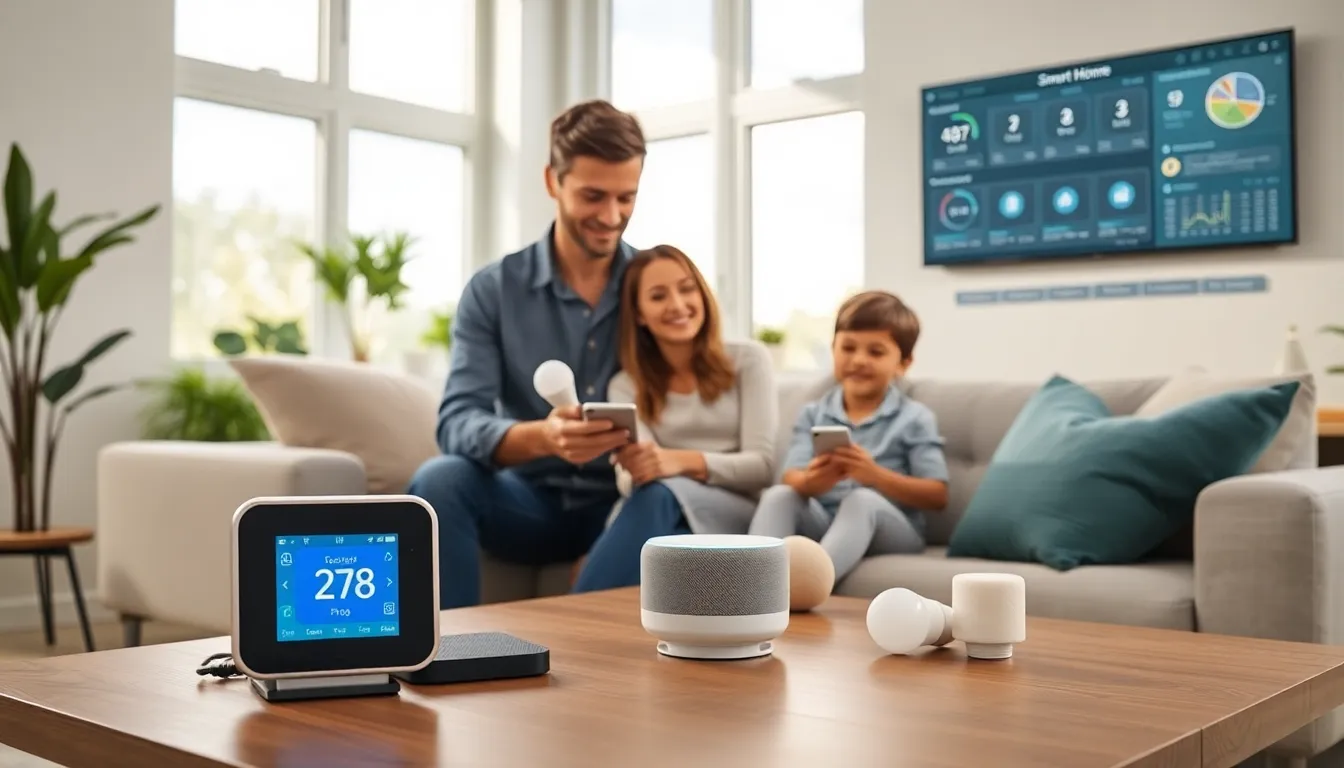Picture this: it’s the year 2030. You walk into your smart home, and it greets you like an old friend. Your coffee brews perfectly at the right temperature while your curtains adjust to the sunlight filtering through. Sounds dreamy, right? As we plunge further into this digital age, smart homes are evolving at lightning speed, promising innovation that could outsmart even the most seasoned tech enthusiasts. In this exploration of the future of smart homes, we’ll jump into trends, technologies, and the challenges that come with living in a home smarter than ever before.
Table of Contents
ToggleEmerging Trends In Smart Home Technology

Artificial Intelligence And Machine Learning Integration
Artificial Intelligence (AI) and machine learning are becoming the beating heart of smart home technology. Imagine your home learning your habits, adjusting the thermostat before you even realize you’re feeling chilly. This isn’t just fantasy: it’s the evolution of comfort and convenience. AI-powered systems analyze data over time, adapting to individual preferences, which makes the home feel personalized. From recommending the best lighting for a movie night to alerting you when it’s time to water your plants, AI enhances user interaction, making homes not just smart, but incredibly intuitive.
Home Automation Systems And IoT Advancements
The Internet of Things (IoT) continues to flourish, bringing diverse gadgets together like a tech-savvy orchestra. Smart bulbs, refrigerators, and security systems now communicate seamlessly, creating a harmonious living environment. Home automation systems are stepping up their game with robust platforms that allow remote control from mobile devices. Picture setting your home to “away” mode while you’re on vacation, receiving alerts if anything unusual occurs. This interconnectivity not only simplifies daily tasks but also enhances overall comfort and control.
Sustainability And Energy Efficiency Innovations
Smart Energy Management Systems
Amid concerns about climate change, energy efficiency is taking center stage in smart home development. Smart energy management systems now allow homeowners to monitor consumption patterns in real-time. These systems can identify peak usage times and recommend changes to save on bills while being eco-conscious. By integrating solar panels with smart technologies, homeowners can optimize energy use further, ensuring that their gadgets are both effective and sustainable.
Eco-Friendly Smart Devices
The market is flooded with eco-friendly smart devices designed not just for convenience but for a greener planet. From energy-efficient appliances to smart irrigation systems that only water gardens when needed, these devices help make environmental responsibility a part of everyday life. The future is about blending technology with sustainability, ensuring that innovation does not come at the cost of our planet.
Enhancing Security In Smart Homes
AI-Powered Security Solutions
Security remains a top concern for homeowners, and AI is rising to the occasion. Smart locks and cameras use AI algorithms to detect unusual activity, sending alerts in real time. Instead of sifting through hours of footage, these systems can highlight potentially suspicious behavior or even distinguish between familiar faces and strangers. This technology simplifies home protection, ensuring peace of mind for occupants.
Smart Surveillance and Monitoring Systems
Gone are the days of bulky surveillance cameras that break the aesthetic of a home. Today’s smart surveillance systems are sleek and sophisticated. With features like motion detection and night vision, homeowners can monitor their property from smartphone apps. Cloud storage options mean precious footage can be saved and accessed easily, enhancing security while providing convenience.
Impact Of 5G On Smart Home Connectivity
Improved Device Communication
5G is not just a fancy buzzword: it’s a game-changer for smart homes. With lightning-fast download speeds and reduced latency, devices can communicate instantaneously. This means smarter interactions: your refrigerator can talk to your grocery delivery service about what’s inside and recommend recipes, all while you sit back and relax. The future holds the promise of homes that not only share data but anticipate needs before you even articulate them.
Faster Data Processing For Enhanced User Experience
Thanks to 5G, data processing will be faster than ever, significantly enhancing the user experience. Imagine watching a security feed without lag or controlling multiple devices seamlessly through one app. This capability makes smart homes more responsive, encouraging more users to embrace this technology as it becomes even more accessible.
Future Challenges And Considerations
Privacy And Data Security Concerns
As smart homes grow in functionality, concerns around data privacy and security become increasingly important. With devices collecting vast amounts of personal data, potential breaches could have serious implications. Homeowners must be vigilant and ensure robust security measures are in place. Education about how to protect personal information will be crucial as technology continues to evolve.
Interoperability Among Devices
As the smart home market expands, the need for devices to work together seamlessly is paramount. Currently, homeowners often face issues with devices from different manufacturers not communicating well. The future lies in standardization, simplifying user experiences by ensuring that all devices play nicely together, regardless of brand.


